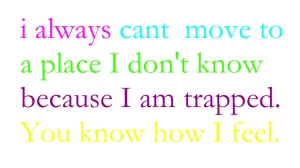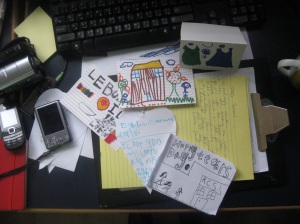Journey of Learning, Part 2
So…after thinking about how a child’s journey of learning could be illustrated, I started thinking about my own learning. You know what? I found it to be daunting to summarize ALL of my learning throughout my entire life. That’s seriously a lot of learning. Even to be able to write this now, I had to first learn how to speak, tell a story, understand letters/words/sentences/, write, type, operate a computer, etc. It could go on forever! Then, I tried paring it down to just my learning-to-be-a-teacher learning, but I found that it was not possible to separate my “professional learning” from any other “life learning.” My knowledge of how help children master the alphabet is equally as valuable to my job as knowing when to give someone a hug. Also, just for the record, I spent part of the day [lovingly] wiping up runny shit from a kid’s leg, and that was equally important to doing my job. Seemingly, we need all kinds of knowledge in every realm of our lives to be successful people.
This thought anchored in the belief that schools must teach to the “whole person,” without attempting to isolate one subject from another. The more schools can integrate subjects, the better.
(Note: The boy with diarrhea is thankfully feeling much better now, and I like to think our relationship is better for the incident.)
Journey of Learning, Part 1
This year, we’re asking families to partake in their children’s portfolios. The portfolios are intended to show the journey of learning that happens for each child throughout the year, and attempting to do so without the input of the parents would just be silly.
So, we’ve asked each family to share their hopes and dreams for their child in his portfolio, and opened up the format to be inclusive of many different languages of expression among the parents: pictures, drawing, poetry, videos, and voice recordings are a few of the ways we discussed at the parent meeting, and I’m excited to listen to the parents in this way.
I found an article on GOOD in which four people take a reflective look at their learning journeys, illustrating some pivotal moments along the way. Although a more retrospective outlook on learning than what we’re asking of parents, it’s interesting to see how each person chooses to illustrate his or her learning, and what is valued along the way.
Setting Up Shop
Whew. We just spent an entire week, more than 50 hours, setting up the classroom, discussing possibilities for the year, and sharing our ideas and questions as a faculty. We have pushed around so much furniture, lifted so many boxes, and here we are. Physically exhausted, excited, mentally prepared, and ready for kids. I’m looking forward to sharing these conversations in this space.
Also, if I never have to use contact paper or a staple gun again, I will be a happy woman.
Now we have a week off between our inservice and when students arrive, to celebrate the holidays with family and friends, and to get lots of sleep before the school year begins. Eid mubarak!
On Talking to Little Girls
 I came across this article a few weeks ago, and although not written by an educator, Lisa Bloom has some interesting thoughts as to how we talk to little girls, particularly the impulse to give a compliment on outer-appearance as an icebreaker to start a conversation. It’s socially accepted, and even polite in some cases, to greet people this way, especially women and girls, but maybe we should bite our tongues and think a little more critically before haphazardly greeting little girls with compliments about their clothing or appearance. Bloom writes,
I came across this article a few weeks ago, and although not written by an educator, Lisa Bloom has some interesting thoughts as to how we talk to little girls, particularly the impulse to give a compliment on outer-appearance as an icebreaker to start a conversation. It’s socially accepted, and even polite in some cases, to greet people this way, especially women and girls, but maybe we should bite our tongues and think a little more critically before haphazardly greeting little girls with compliments about their clothing or appearance. Bloom writes,
Teaching girls that their appearance is the first thing you notice tells them that looks are more important than anything…. As our cultural imperative for girls to be hot 24/7 has become the new normal, American women have become increasingly unhappy. What’s missing? A life of meaning, a life of ideas and reading books and being valued for our thoughts and accomplishments.
I’ve been wondering about just how often I do this, and it’s made me realize that, although I like to think that I generally don’t discriminate on account of gender, there’s always room for improvement. So how can we shift conversations with girls away from beauty, and toward valuing the female brain? Bloom makes a relatively simple suggestion: books!
Try this the next time you meet a little girl. She may be surprised and unsure at first, because few ask her about her mind, but be patient and stick with it. Ask her what she’s reading. What does she like and dislike, and why? There are no wrong answers. You’re just generating an intelligent conversation that respects her brain. For older girls, ask her about current events issues: pollution, wars, school budgets slashed. What bothers her out there in the world? How would she fix it if she had a magic wand? You may get some intriguing answers. Tell her about your ideas and accomplishments and your favorite books. Model for her what a thinking woman says and does.
Will this change the way women are treated and create more equity between the sexes? Probably not, but it is one nudge toward showing a little girl that, above all else, we value her thoughts and ideas.
Read the whole article here.
Making a Plan
“That is a design. First I drawed a design in the writing center. Then, I used the felts.”
I love watching my students making their plans come to life with other materials. This has helped many students visualize their work before it’s created, and I’ve noticed that more time is spent on the details.
Who’s the boss?
Conversation during snack today:
Adam: Who’s the boss here?
Me: I am, right?
Wael: No no no, we’re our own bosses.
Me: Oh yes! That’s true, too.
Adam: OK who’s your boss?
Me: Ms. Hutchison’s my boss.
Paul: Who’s her boss?
Me: A man named Dr. Damon. He’s the boss of the whole school.
Wael: Ahhhhhhh!
Paul: Awesome!
Adam: …Who’s his boss?
Me: There’s a group of people called “the board.” They make big, big, big decisions for our school. It’s a big job.
Adam: Who’s their boss?
Me: They’re their own bosses, I think.
Wael: Like us! But who are we really the bosses of?
Paul: I think we’re the bosses of cats.
Adam and Wael laugh hysterically.
Paul: Yea, we must be the bosses of cats!
Divurgent thinking is an essential capacity for creativity. It’s the ability to see lots of possible answers to a question, lots of possible ways to interpret a question…to see multiple answers, not one. [For example] How many uses can you find for a paper clip? [Researchers] tested this, and gave the test to 1500 people in a book called Breakpoint and Beyond, and on the protocol of the test, if you scored above a certain level, you’de be considered to be a genius in divurgent thinking…98% of kindergarteners scored above genius level.
Sir Ken Robinson, on Changing Educational Paradigms. Watch the animation here.
Happy Teacher’s Day!
Here is my delightfully messy desk, piled with love notes. What? You mean in other professions the people you work with don’t write you notes decorated with hearts and trees and houses? What kind of a work environment is that?!
Tomorrow in Lebanon is Teacher’s Day. This is the only country I’ve heard of that takes a day off in recognition of it’s teachers, and I have to say, it’s nice to be appreciated. Today I received some beautiful handmade cards and a popcorn necklace, “In case you get hungry, then you can just eat!” Genius.
“What does it mean . . . ‘from?'”

“Where are you from?” It’s seemingly a simple, straightforward question. I was at the big, rectangle table with a group of students several weeks ago, and heard students comparing notes about where they are from. We are lucky to have an interesting mix of nationalities – although only 3 of the 21 students are completely non-Lebanese, meaning they have no genetic ties to Lebanon, the rest are a schmorgesborg of Lebanese, Lebanese-American, Lebanese-British, Lebanese-Jordanian, etc. Most of the kids that fell into one of the Lebanese categories who were at the table identified themselves as Lebanese, although a few recognized that they were born elsewhere. One student said he was born in Cambridge, England (he was), and attempted to prove it by saying so in an “English” accent (it wasn’t).
Then I was surprised when one student with two American parents and a clear–cut American accent asked, “Miss Lauren . . . what does it mean, ‘from’?” (Now, trust me, this girl knows the word from and can use it appropriately in a sentence. This is the same child who wrote the above poem on the family computer at home, color editing is hers) I had assumed that she would identify herself as an American. Clearly she was thinking otherwise, and frankly, why not?
“Well, my family was here, and then moved and I was born in Saudi, and then we lived in China, and now we’re here!!! So I don’t know!” Then she continued working on her drawing. She wasn’t sad about the situation . . . “happily perplexed” is probably the phrase I would use.
Since that conversation, I have heard Hannah telling others, confidently, that she’s from Saudi Arabia. This, it seems, is a logical response, seeing as that is where she was born. I can respect that. The rest of the class still think she’s Chinese.
To: P.O. Box 0101110101
Bill Gates for the Washington Post, on teacher development.
Firstly, thank you for all the work you’re doing – researching, funding, and supporting education. You are making an effort to improve the educational experience of children all over the world, and that is truly commendable and very helpful.
Although you didn’t specifically put it this way, I think it’s important to make clear that a “crisis in education” shouldn’t be pegged with the country’s economic standing. I hear a lot of politicians justifying spending on education by showing what it can do for our country economically or politically. Sure, if we started doing some in-vitro math drills, we might end up with American 6-year-olds who surpass other 6-year olds on meaningless tests, but there would be a cost, and it would most likely be playing around with glue and paper scraps, which I think is really important. I’m terrified to think that educational policies are being written by those looking out for our nation’s prosperity and economic standing, rather than for, oh you know, our children.
Again, you didn’t put it this way, but when I hear the U.S. being compared to educational systems elsewhere, I certainly start thinking about politics. I don’t think I’m the only one. What does it say for our society if the primary way we justify education is for the economic gain of our country? I think the end-goal of most parents isn’t to raise children that are economically competitive, but to raise children who are happy and have the tools to reach their goals. I hope you agree.
Right on about giving teachers feedback and training to improve the quality of education for students. In my school, we use videotapes of ourselves to discuss what-went-well and what-was-crap (these aren’t the professional terms), and it is terrifying but extremely helpful as a teacher. When I read this, I thought about the trend in many U.S. school districts of replacing administrative positions traditionally held by educators, and instead, seeking business-oriented resumes. Although delegating business-y things to an appropriately minded person would free up administrators to help in the classroom and give feedback, what I notice is that these people are being REPLACED by people who have little or no educational background. Who will provide the feedback? Who will provide the training? I say this, also, with the pretext that my own administrator has helped shaped my beliefs and strengthened my skills in the classroom, and I can’t imagine what kind of teacher I’d be otherwise. On a side note, have you ever watched yourself on video? It’s truly a horrific experience, but gets better after the first few times.
Also, if you could make a way to embed video into Publisher documents, my student portfolios would be totally rad.
xoxo Lauren






